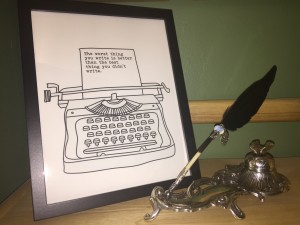 If you’ve been dedicated and written on a regular basis, you now have a bunch of scenes or chapters in your story. However, any progress is better than none, so keep at it until you have created a habit that works for you. Don’t be discouraged if your computer sat untouched for days. As I am fond of saying,It is okay to make today the next first day of the rest of your life. Write down your dream and stick it where you can see it. “I am a writer.” Write it in lipstick on the bathroom mirror, or with colorful markers on the white board at work; post it wherever you will see it multiple times each day. Find a local writers group and make some writing friends. Join a critique group where you are required to submit a set number of pages every month. Do whatever it takes to step out of your old habits and into the life you have dreamed of.
If you’ve been dedicated and written on a regular basis, you now have a bunch of scenes or chapters in your story. However, any progress is better than none, so keep at it until you have created a habit that works for you. Don’t be discouraged if your computer sat untouched for days. As I am fond of saying,It is okay to make today the next first day of the rest of your life. Write down your dream and stick it where you can see it. “I am a writer.” Write it in lipstick on the bathroom mirror, or with colorful markers on the white board at work; post it wherever you will see it multiple times each day. Find a local writers group and make some writing friends. Join a critique group where you are required to submit a set number of pages every month. Do whatever it takes to step out of your old habits and into the life you have dreamed of.
As previously mentioned, I choose to write each scene in its own word document. I write each scene ‘title’ on a sticky note and stick it to a piece of poster board. After I have a handful of notes, I arrange them in the order they will appear in the story, leaving space for the scenes which still need to be written. The more I write, the more sticky notes join the others, which further motivates me to write more.
Sometimes it is helpful to create a timeline to identify the missing scenes in the story. After drawing a line horizontally across the poster board, I identify the months/seasons/years that pass. I write the names of every character on smaller sticky notes and stick them under the scenes in which they appear. This ensures that I have no characters who do not serve a purpose or who appear once and never again.
Utilizing the poster board and sticky notes, I put my story together visually. It’s much easier to rearrange scenes or chapters this way. Then I assemble the manuscript into one document and read it start to finish. If something jumps out at me as incorrect, I make a note in red (or add a Comment using Microsoft Word’s tool). I don’t spend a lot of time in the first pass. Then I go back and make the changes I previously identified. Reward yourself for the progress you have made.
The next step is the most difficult. Set the manuscript aside for at least a week, but a month is better. Pick up another project, but put this manuscript on your calendar for a future date. Read it again, start to finish, making additional notes and/or corrections.
Next: preparing your manuscript for proofreading and editing.

